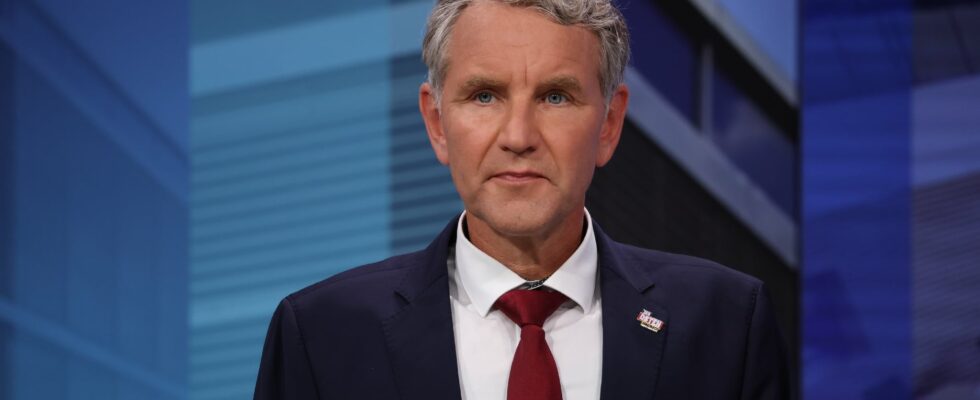The Alternative for Germany (AfD) has a good reason to pop the champagne on Monday, September 2. The day before, the German far-right party won a historic victory in the regional elections. A first since the end of the Second World War. In the rural state of Thuringia, the nationalist party’s list won nearly 33% of the vote, almost ten points ahead of the conservative CDU.
A tidal wave that is not unrelated to the knife attack committed by a Syrian refugee at the end of August, but also to the sulphurous personality of the leader of the Thuringia federation of the AfD. A certain Björn Höcke, a former history teacher who has been collecting racist, homophobic, Eurosceptic and conspiratorial formulas for about ten years. Outbursts that have nevertheless had the effect of propelling the fifty-year-old to the forefront of the federal political scene.
A nostalgic for the Third Reich
Thus, on August 17, he made the cover of the investigative weekly The Mirrorwith an unequivocal title: “How fascism begins.” The native of the Rhineland municipality of Lünen is illustrated alongside the honorary president of the National Rally (RN) Marine Le Pen, and the Republican candidate for the presidential election, Donald Trump. The fact remains that if the three political leaders are part of a similar ideological line, confining Björn Höcke to a conservative right-wing label seems reductive. And this, for several reasons.
First, there is his barely veiled nostalgia for the Third Reich. Last July, Björn Höcke was fined 16,900 euros for using “Alles für Deutschland” (“Everything for Germany”), in french). A motto borrowed from the Assault Sections, better known by the acronym “SA”, the paramilitary organisation of the NSDAP, the National Socialist German Workers’ Party. A reference that the slender man with the steely blue eyes swore he did not know during a previous trial guilty of breaking a German law banning the use of Nazi slogans.
It must be said that this double incident is part of a series of statements minimizing Germany’s role in the Holocaust. In January 2017, the head of the Thuringia federation of the AfD, considered the most radical in Germany, for example described the Holocaust Memorial located in the heart of Berlin of a “monument of shame”. Yet another provocation that earned him harsh reprimands internally, and threats of exclusion that came to fruition with no fewer than eight liftings of his parliamentary immunity.
AfD forced to come to terms with character
However, all these attempts to sideline him have ended in failure. And in a few months, Björn Höcke has managed to establish himself as the “real boss” of the extreme right in Germany, as the headline reads The Guardian this Monday morning. Thus, the AfD voices that once criticized him in the media have gradually fallen silent, forced to note that his populist style seasoned with ultra-provocative statements is attractive.
At his meetings, Björn Höcke does not hesitate to offer activists what could vaguely resemble a one man show. Like this day, when he serves up a humorous pirouette with climate-sceptic overtones to a wondrous crowd: “The coldest May in 140 years… Solid proof of man-made climate change.”
Hilarity from sympathisers who also seem to appreciate his pro-Russian stance and his tirades against the Brussels mysteries: “4,000 EU bureaucrats earning salaries of over €290,000 (“more than the German Chancellor!”), and €60 million wasted each year in Thuringia to pay inflated benefits to refugees who falsify their age.”
However, in a country where the famous “grand coalitions” are the rule and not the exception, Björn Höcke knows that he risks being forced to moderate his speech. The winner of Sunday’s election has also said that he is “ready for cooperation”. But his calls to form coalitions have so far all been met with a rejection. In a message published on Facebook In the morning, German Chancellor Olaf Scholz urged parties to build coalitions “without the far right.”[Ces] results are worrying […]”, he believes. And the social democratic leader, whose party is being undermined in Saxony by the breakthrough of the nationalist party, argues: “The AfD is harming Germany. It is weakening the economy, it is dividing society and it is ruining the reputation of our country.”
